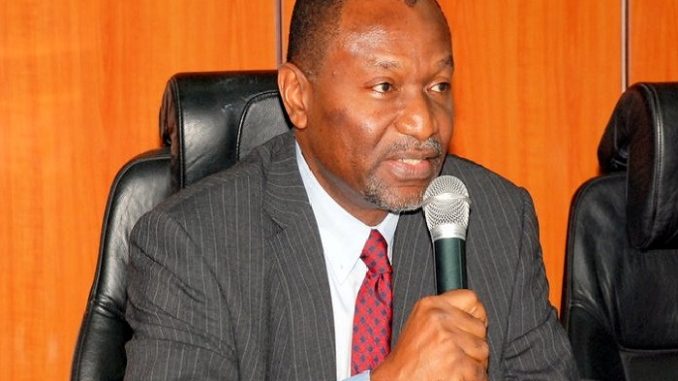
· Buhari presents Appropriation Bill to NASS
Ahead of today’s presentation of the 2017 Appropriation Bill to the joint session of the National Assembly by President Muhammadu Buhari, the Federal Government has unveiled more avenues for generating revenue to fund the budget.
Instead of relying on the regular sources of funds to execute the budget, the Federal Government on Tuesday said that it will issue new oil licences to prospective companies to garner revenue for the execution of projects contained in the budget.
The Minister of Budget and National Planning, Udoma Udo Udoma, gave this indication when he made a presentation at the meeting convened by the Joint Committee of the Senate on Appropriation and Finance to consider the revised Medium Term Expenditure Framework (MTEF) and the Fiscal Strategy Paper (FSP).
Udoma said the Executive arm of government will issue new oil licences, review the current joint venture arrangements with oil companies, review marginal oil fields and mount pressure on revenue generating agencies to surpass expected targets.
Apart from the new strategies to get the country out of the current recession, the minister stated that the 2017 Budget oil benchmark is pegged at $42.50 as against the $38 per barrel in the 2016 Budget.
The daily oil production for 2017 is retained at 2.2 million barrel while the exchange rate is N305 to the dollar. The new exchange rate is significantly higher than that of 2016. The 2016 Budget exchange rate was pegged at N197 to a dollar.
Udoma hinted that a total of N10 trillion is being targeted by the Federal Government as revenue for the fiscal year, of which N5 trillion will come from the sale of crude oil.
The Non-oil sources will rake in about N5.06 trillion, specifically from corporate and company taxes, Nigeria Liquefied Natural Gas (NLNG), stamp duties, capital gains tax, Value Added Tax (VAT), customs, excise, fees, surcharges on luxury items, special levies and Federal Government independent revenue.
The 2017 Budget, which was initially pegged at N6.6866 trillion, has also been revised upwards to N7.298 trillion. In 2016, the Federal Government submitted an ambitious N6.059 proposal to the National Assembly.
In the incoming year, the government will expend N1.488 trillion in servicing domestic debts. In the 2016 budget, the government voted N1.307 trillion for debt servicing.
On foreign debt, Udoma said that the government will spend N175.882 billion. It spent N54.480 on foreign debt-servicing in the 2016 Budget.
On capital expenditures, the Executive arm of government voted N2.058 trillion while in 2016 it was N1.587 trillion.
The minister said that recurrent expenditures will gulp N1.866 trillion. About N1.748 trillion was budgeted for the same purpose in the 2016 Appropriation Law.
The government also intends to borrow a total of N2.321 trillion. Of this figure, N1.253 trillion will be sourced locally while N1.067 trillion will come from foreign sources. In the 2016 budget, N1.182 trillion was reportedly borrowed locally while N635.8 billion came from foreign borrowing.
Speaking further on the budget projections, Udoma said: “I know that N7 trillion seems larger than N6 trillion. In actual dollar term, the 2017 Budget is smaller. We have had challenges in revenue-generation in funding the 2016 budget. We are trying to get to the bottom of revenue-generating agencies in order to raise more money.
“On independent revenue, we need to work with the National Assembly. The issue of 80 percent of operating surplus is a problem. We need to work with the National Assembly to review certain clauses of the law. We need to be more imaginative and creative in order to get out of the problem we have with revenue-generating agencies.
“We want to issue a presidential order to ensure that revenue-generating agencies are unable to spend money unless for the payment of salaries until their budgets are passed,” he said.
Meanwhile, the House of Representatives has adopted the 2017-2019 MTEF and FSP, but pegged the exchange rate of the naira to a dollar at N350 as against the N305 proposed by the Executive.
It however concurred with President Buhari on the oil benchmark of $42.50 per barrel with a proposed daily production of 2.2 million barrels per day.
The House also mandated its Joint Committees on Finance, Appropriation, National Planning and Economic Development, Legislative Budget and Research and Aids, Loans and Debt Management to scrutinise the document.
Moving the motion for the adoption of the MTEF/FSP, the House Leader, Hon. Femi Gbajabiamila, said Section 11(2) of the Fiscal Responsibility Act, 2007, provides “that the MTEF shall be considered for approval with such modifications, if any, as the National Assembly finds appropriate by a resolution of each House of the National Assembly”
He said some analysts forecast that the shortage of forex supply may push exchange rate to as high as N350 to the dollar in the official market and N500 in the parallel market, recommending that “the budgeted exchange rate of N290 per dollar is unrealistic and should be moved to N350 to encourage foreign capital inflows”.
– Authority